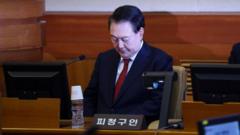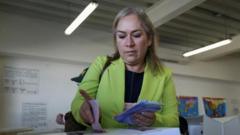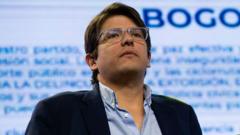In his recent trial regarding impeachment, President Yoon Suk Yeol faces serious charges amid ongoing political turmoil in South Korea, emphasizing the complexity of his situation.
Impeachment Crisis in South Korea: President Yoon Denies Allegations

Impeachment Crisis in South Korea: President Yoon Denies Allegations
South Korea's suspended president Yoon Suk Yeol confronts impeachment trial, denying martial law arrest orders.
South Korea's suspended president Yoon Suk Yeol made a significant appearance at his impeachment trial, addressing allegations that he ordered the arrest of lawmakers during his controversial declaration of martial law. The impeachment proceedings, initiated last month by Parliament, have now shifted to the constitutional court, which will determine whether Yoon should be permanently removed from office.
Yoon, currently under detention, is entangled in a separate criminal investigation regarding accusations of leading an insurrection. During his transportation to the court, security was heightened as police used human barriers and anti-riot measures to hold back hundreds of enthusiastic supporters who gathered outside. Tensions flared over the weekend with multiple violent clashes between Yoon's supporters and law enforcement, culminating in a storming of another courthouse.
When questioned on whether he had instructed military commanders to forcibly remove lawmakers from Parliament to uphold his martial law order, Yoon firmly replied, "No." Allegations rose that on December 3, amid lawmakers’ attempts to overturn his martial law, Yoon issued orders for military intervention. Despite citing threats from "anti-state forces" and North Korea as justification for his actions, his legal counsel contended that his martial law declaration was more of a procedural step rather than an intended enforcement.
Following nearly two hours of courtroom drama, Yoon expressed his commitment to democratic principles, urging the constitutional court to conduct a thorough review of the case. Conversely, the parliamentary-appointed prosecutors characterized Yoon's arguments as "conflicting, illogical, and ambiguous," warning that further evasiveness could damage his case.
Outside, growing unrest among Yoon's supporters was palpable as they rallied for his immediate release and reinstatement. Many waved a combination of Korean and American flags, while others donned caps echoing US President Donald Trump’s campaign slogans. Amid violent chants demanding severe repercussions for opposition leaders and investigators, some supporters defended Yoon's actions as a protective measure for South Korean democracy, accusing the opposition of pro-communist affiliations.
As the political impasse continues in South Korea, a testimony from former defense minister Kim Yong-hyun, who purportedly suggested martial law to Yoon, is scheduled for the next hearing on Thursday. Should at least six of the eight judges in the constitutional court uphold Yoon's impeachment, a presidential election would be mandated within 60 days.
The ongoing political instability has led to widespread public demonstrations, straining the country’s economy and resulting in the weakening of the Korean won and cautionary assessments from global credit agencies regarding business and consumer confidence.





















